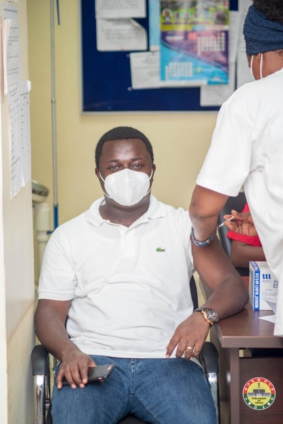The Ghana Health Service (GHS) has urged Ghanaians to participate actively in the second phase of the roll-out of the Covid-19 vaccine.
Speaking to the media, Ashanti Regional Health Director, Emmanuel Tinkorang stressed that the vaccines procured by the government are safe and would ensure immunity against the Coronavirus disease.
“The vaccines are safe and protective despite the negative things you have heard about it. One thing we can assure you as a health system is that, we will make sure we give you a vaccine that is safe and protective and will help you so that you won't die from Covid-19.
“Once you are given your second dose, it means that you have completed your vaccination and as far as your immunity is concerned, it will be high enough to prevent you from the mortality that is associated with Covid-19.” he said.
Ghana is expected to commence its second phase of inoculation on Wednesday, May 19.
The Ashanti Region, he says has received 153,000 doses of AstraZeneca vaccine out of the 350,000 procured by the government for its vaccination exercise.
Although 250,000 persons received their first jab in the region, Mr Tinkorang noted that only persons who were vaccinated between March 2 and 9 would be permitted to receive the second dose this week.
He also stressed that, without vaccination identification cards, persons who arrive at the health facilities would not be attended to.
“If you were vaccinated between March 2 and to 9, it means that you are due for your second dose and whereever you are located, try as much as possible to go to the facility where you were given the first dose to have your second jab.
“The data has been provided to these facilities so when you go, you will be identified. You will have to go with your vaccination cards. Without your vaccination cards, you will not be immunized because your special ID is on the card and that is what we can retrieve,” he stated.
He also used the opportunity to dismiss claims that the AstraZeneca vaccines lead to blood clot.
According to Mr Tinkorang, records in the Ashanti Region do not show reports of such cases. He therefore urged persons to refrain from comparing incidents from other countries to those in Ghana.
“In Ghana, we have not recorded any blood clots. As far as I am concerned, in Ashanti Region, most of them were fever, body pains and others. Those who died, their death cannot be attributed to the vaccine.
“So what is happening in other countries, you cannot use it to describe what is happening in Ghana,” he said.
He further revealed that data from all 16 regions would be analysed by the Pharmaco Vigilance Unit of the Food and Drugs Authority (FDA) and “we will come out with what we call Ghana's situation.
Latest Stories
-
Ken Ofori-Atta listed on INTERPOL Red Alert over “using public office for profit”
1 hour -
World Vision empowers health workers in Agortime Ziope with life-saving infection control training
1 hour -
Plan International Ghana launches She Leads Social Movement to sustain girls’ rights advocacy
1 hour -
Gov’t pledges action to empower girls, young women at She Leads Social Movement launch
2 hours -
Environmentalists push for waste-to-wealth innovations on World Environment Day
2 hours -
GRNMA strike: Sick pockets can’t take care of sick patients – Ashanti GRNMA
2 hours -
Traders appeal for designated spaces after Accra decongestion
2 hours -
F1’s return to Africa: will legacy, ambition, or diplomacy win the race?
2 hours -
Thomas Partey headlines fourth edition of All Star Festival
2 hours -
World Environment Day: GJESHA urges media, gov’t to step up fight against plastic pollution
2 hours -
Yamal scores twice as Spain beat France in nine-goal thriller to make Nations League final
3 hours -
Nestlé Supplier Day 2025: Fostering collaboration for sustainable growth
3 hours -
Don’t risk progress with new reforms – IERPP cautions BoG
4 hours -
Planting for the Future: Forest clubs and tree planting drive to combat environmental damage
4 hours -
Over-concentration of resources in urban centres stifling national economic progress – Nii Moi Thompson
4 hours

